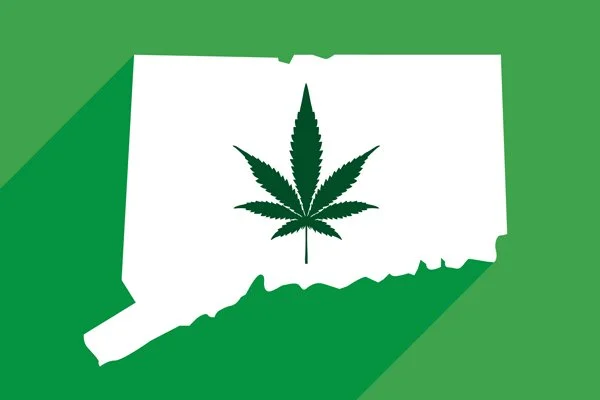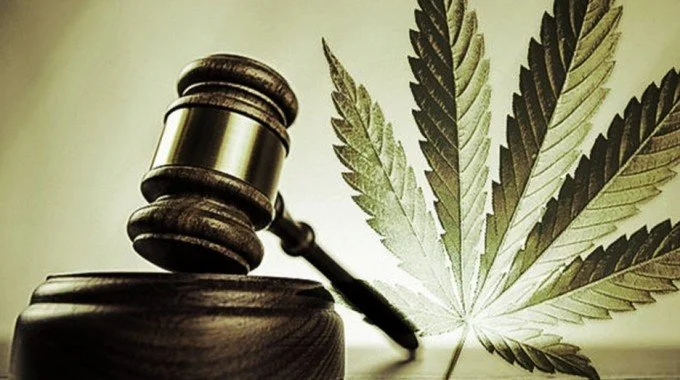Last Week In Weed Issue 27
Published June 21st 2021
In this week’s Last Week in Weed, We’ll be looking at Connecticut becoming the 19th ‘legal’ adult consumption US state, TIGGR recommending an overhaul of the UK ‘Hemp’ and ‘medical cannabis’ industry, and a UK solicitor tells a magistrates court his client will continue to consume cannabis despite prosecution.
Connecticut set to become 19th US state to ‘legalise’ adult consumption
Last week saw the announcement that Connecticut is likely to become the 19th state to ‘legalise’ adult consumption of cannabis. The New England state joins its neighbour New York who also ‘legalised’ cannabis earlier this year.
The bill would ‘legalise’ personal possession of up to 1.5 oz and up to 5 oz at home from July 1st, 2021. It would allow for homegrown but not until July 1st, 2023, with 6 being the allowed total. Three mature and three immature per person.
The bill would also expunge low-level and petty convictions and direct most of the tax revenue towards communities disproportionately impacted by cannabis prohibition. Just as they have done in New York, half of the state’s adult-use licenses will only be issued to social equity applicants.
“The war on cannabis, which was at its core a war on people in Black and Brown communities, not only caused injustices and increased disparities in our state, it did little to protect public health and safety. It will help eliminate the dangerous unregulated market and support a new, growing sector of our economy which will create jobs” – Connecticut Governor Ned Lamont
Once passed into law, New Hampshire and Rhode Island would be the only states left in the northeast peninsula yet to ‘legalise’ adult consumption. Although, I expect that by the time the May 2022 deadline set for adult sales to start in Connecticut comes around, that these two will be finalising their adult consumption bills.
“The states surrounding us already, or soon will, have legal adult-use markets, by allowing adults to possess cannabis, regulating its sale …we’re not only effectively modernizing our laws and addressing inequities, we’re keeping Connecticut economically competitive with our neighboring states” – Connecticut Governor Ned Lamont
With neighboring states set to launch commercial sales in the coming years, it simply makes sense to be at the forefront of reform and innovation than lagging behind it. Connecticut’s market is expected to be worth $725million by the end of 2025 and contribute an additional $600million in tax revenue over the first five years.
“This year has shown us that state legislatures are capable of rising to the challenge to end cannabis prohibition. A supermajority of Americans have made it clear that they favor a system of legalization and regulation rather than the status quo. This victory will add to the momentum towards cannabis policy reform in other states and at the federal level” – Karen O’Keefe Marijuana Policy Project
The ‘legal’ cannabis industry in the US is estimated to grow to be worth over $43billion a year, and that is without any form of federal reform, decriminalisation, or the passing of the MORE ACT. An estimated 43% of American’s now have access to legal adult-use cannabis. The momentum around cannabis reform in the US House and Senate has never been higher, so expect to see more states turning green real soon.
TIGGR recommend changes to UK ‘Hemp’ Industry
Last week saw the release of the final 140-page report by The Taskforce on Innovation, Growth and Regulatory Reform (TIGRR) The task force was set up by the current Conservative government to explore ways they could boost the economy by exploiting new regulatory loopholes and blind spots created by the chaos and confusion surrounding the UK’s withdrawal from the European Union.
In their report they make a hundred recommendations around UK industry, two of which pertain to the cultivation of Low-THC cultivars of Cannabis Sativa colloquially known in the UK as ‘Hemp.’ These Low-THC cannabis varieties have been grown in the UK for their rather strong and durable fibres and highly nutritious seeds for hundreds, if not thousands of years.
Unfortunately due to licensing limitations the extraction of Cannabinoids such as CBG and CBD from these cultivars isn’t economically viable or sustainable here in the UK. This is because low-THC cannabis cultivation licenses forbid the extraction of desired compounds from the flowers and leaves of the plant, you know the part that contains the most trichomes and thus the most cannabinoids and terpenes.
“The current regime makes it very difficult for scientists in the UK to conduct pharmaceutical research on potential medical benefits of cannabinoids and medicinal CBD. International examples and leading scientists working in this area have shown that sensible, but limited, reforms to the current licensing process could unlock significant investment into UK medical research into cannabinoids for pain relief” – TIGGR report
TIGGR is seeking to end this limitation, well partially for the ‘hemp’ and ‘medical cannabis’ industries at least. They are recommending that the UK government change the licensing system and move the regulation of ‘medical cannabinoids’ and ‘medicinal CBD’ (whatever that is) from the Home Office to the DHSC / MHRA (Department of Health and Social Care and Medicines and Healthcare products Regulatory Agency) “to create a regulatory pathway for assessment and approval based on patient benefit”
“Whilst there is in the UK a fast-growing, legal and well-established consumer market for medicinal CBD for a range of pain and neurological conditions, current Home Office rules make it impossible for them to be produced here. This means that domestic consumers are relying on imported products and the UK is losing out on a £1 billion medicines industry” – TIGGR report
‘At present, this is prevented because the rules governing CBD medicines are not properly separated from the criminal law on banned substances derived from cannabis. ‘Our recommendations cover legal-to-use CBD medicinal products only. This report has focused on potential medical usage and does not recommend decriminalisation for recreational use.’
UK PM Boris Johnson welcomed the report saying that: “Your report shows what a fully sovereign United Kingdom can achieve given sufficient ambition and vision on the part of its government. I look forward to drawing on your work in the months and years ahead as we build back better than ever before”
A spokesman for the PM has said that he will consider and respond to the report’s recommendations in due course, but I highly doubt that this is currently that high up on his agenda. This debate comes at the same time that Hannah Deacon and other relatives of severely epileptic children continue to pressure the UK government for changes to allow for ‘medical cannabis’ products to be prescribed on the NHS. Last Week the 9-year-old brother of a boy with epilepsy hand-delivered a letter to Boris Johnson at Number 10 Downing Street, asking the PM to help fund his brother’s care and the care of hundreds of other vulnerable children in a similar potion.
Last week also saw a back-bench debate about the Misuse of Drugs Act 1971, which turned 50 this month. The debate was co-chaired by Jeff Smith and Crispin Blunt the MP figureheads for the Labour and Conservative Drug Policy Reform Groups, respectively.
The debate was relatively short and focused primarily on shifting the legal focus from criminalising the small percentage of drug consumers that may develop a dependency issue to pathologising their excess consumption instead of attempting to understand it as a consequence of a toxic and systemically unfair society. (Read the debate minutes here)
While there was discussion on ‘decriminalising’ the personal possession of all drugs there was still little discourse about the vast majority of consumers of all drugs that consume their substance of choice without any personal or social consequences, bar getting caught possessing it, of course.
There is a lot of momentum building around drug reform in the UK but it is all heavily skewed to a medical paradigm and perspective and not a human rights one.
If the ill and infirm have a right to alleviate pain then so do the well have a right to escape the harshness of daily reality or to explore their own vast and infinite consciousness in peace.
UK solicitor tells court client will continue to consume cannabis
Finally this week a solicitor has told a court in South Tyneside that his client will continue to consume cannabis despite his conviction for possession. The solicitor said that his client, a twenty-year-old man from Silksworth, Sunderland consumes cannabis as it helps with his diagnosed Tourette’s syndrome and ADHD.
A local newspaper reported that ‘the young man smoked cannabis as he thought the drug had a positive impact on his health condition.’ After being charged the man’s legal counsel, Greg Flaxen told the court that his client “used cannabis to boost his health and not for getting high.”
“I would have thought a cannabis warning could have been offered at the police station. “He does smoke cannabis on a daily basis. He has Tourette’s, he has the ticks, he has outbursts. One positive of cannabis is the calming effect that it has. He says that it helps with his ADHD. He says that he doesn’t smoke it to get high.”
“You can consider a discharge, either absolute or conditional. He’s made full admissions and has explained that he smokes it every day. I would be wrong to say that he is not going to continue with it. If it’s a choice between health or breaking the law, health seems to take precedence.” –Greg Flaxen, defence solicitor
Ultimately, the magistrates fined the man £80 with additional charges of £85 court costs and a £34 victim surcharge. There is no estimate provided on the cost to the court or the legal system as a whole to establish that this man will continue to prioritise his health over obeying outdated, draconian, and harmful laws.
It is painful to me that as the mountains of evidence continue to build showing that cannabis can help treat and manage a multitude of mental health disorders and conditions such as Tourette’s Syndrome, ADHD, Anxiety, depression, and PTSD. That individuals like this are still being dragged through the legal system and then ordered to pay a ‘Victims surcharge’, despite being a victim themselves of decades of state-sponsored propaganda, prohibition, and ideological terrorism.
Written By Simpa For The Simpa Life



